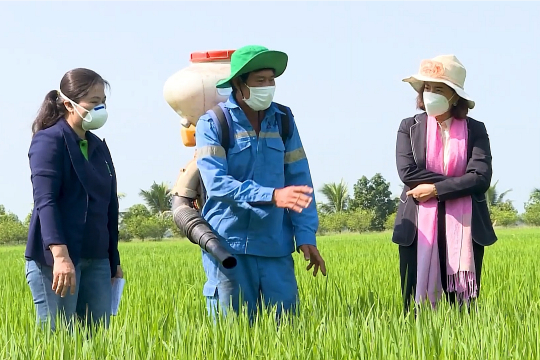After three years of implementation, a laser-assisted land leveling project in the Mekong Delta of Vietnam has yielded significant economic and environmental benefits. Initiated and funded by the Environment for Development (EfD), the project has transformed rice farming in Giang Thanh (Kien Giang Province) and Chau Phu (An Giang Province).
The project, "Heterogeneous valuation and eco-efficiency of Laser Land Leveling in paddy production in the Mekong Delta," aimed to understand farmers' adoption of this innovative technology and its impact on productivity. EfD researchers introduced cutting-edge precision agriculture techniques to help farmers adapt to climate change. By flattening fields with laser-guided technology, the project reduced water, seed, fertilizer, and pesticide use while increasing yields.
Mr. Nguyen Thanh Duoc, Head of Giang Thanh's Agriculture and Rural Development Office, highlighted: "Over three years, over 1,000 hectares in Giang Thanh have been laser-leveled. This method reduces irrigation costs by 15–17%, fertilizer expenses by 15–20%, and seed use. It boosts productivity and income, helping farmers escape poverty and build sustainable rural communities."
Hands-on support for farmers
The research team provided extensive support, including workshops, consultations, and access to funding. About 500 farmers attended ten workshops, with 303 interviewed to assess their willingness to adopt the technology. The project also offered technical assistance and subsidies, enabling smallholders to adopt the technology at reduced costs.
Local farmer Hoang Huy Thang shared his experience: "With 15 hectares of rice fields, laser leveling has saved seeds, reduced labor, and improved yields by 20%. This technology has been a game-changer."
Scaling up for sustainability
Since its launch, the project has grown from pilot testing to broader adoption. The Giang Thanh district now plans to extend the practice to over 2,000 hectares, contributing to larger, climate-resilient rice fields.
Dr. Le Thanh Loan, project leader, emphasized the broader impact: "This project connects farmers, researchers, local authorities, and service providers, creating a network that promotes sustainable practices. By reducing greenhouse gas emissions and conserving water, it showcases the economic and environmental feasibility of laser-assisted leveling."
A sustainable path forward
This initiative demonstrates the potential of precision agriculture in Vietnam. It not only enhances farmers' livelihoods but also addresses challenges like water scarcity and climate change, paving the way for sustainable rice farming in the Mekong Delta.
